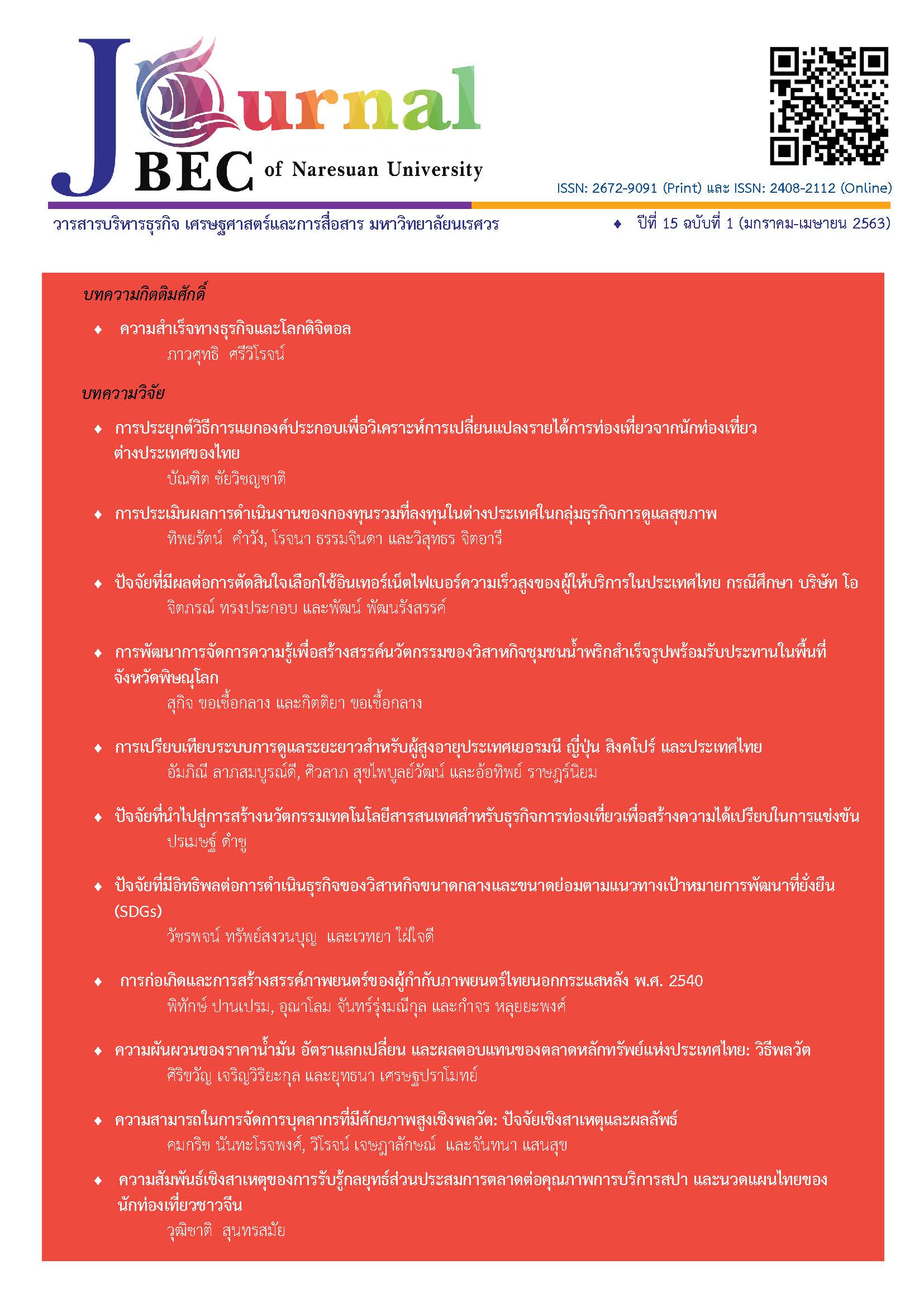ความสัมพันธ์เชิงสาเหตุของการรับรู้กลยุทธ์ส่วนประสมการตลาดต่อคุณภาพ การบริการสปา และนวดแผนไทยของนักท่องเที่ยวชาวจีน
Main Article Content
บทคัดย่อ
บทคัดย่อ
การวิจัยครั้งนี้มีวัตถุประสงค์เพื่อศึกษาการรับรู้กลยุทธ์ส่วนประสมการตลาดของบริการและคุณภาพการบริการ สปาและนวดแผนไทย และตรวจสอบโมเดลเชิงสาเหตุของการรับรู้กลยุทธ์ส่วนประสมการตลาดของบริการต่อคุณภาพการบริการสปาและนวดแผนไทยด้วยข้อมูลเชิงประจักษ์ ใช้การวิจัยเชิงพรรณนา มีกลุ่มตัวอย่างคือ นักท่องเที่ยวชาวจีนในเมืองพัทยาจานวน 400 คน และใช้แบบสอบถามเป็นเครื่องมือในการเก็บรวบรวมข้อมูล นามาสถิติ ค่าเฉลี่ย และส่วนเบี่ยงเบนมาตรฐาน และสร้างรูปแบบความสัมพันธ์เชิงสาเหตุของการรับรู้กลยุทธ์ส่วนประสมการตลาดของบริการต่อคุณภาพ การบริการสปาและนวดแผนไทย ด้วยรูปแบบความสัมพันธ์โครงสร้างเชิงเส้น และทดสอบความสัมพันธ์ที่ระดับนัยสาคัญทางสถิติ 0.05
ผลการศึกษาพบว่า นักท่องเที่ยวมีการรับรู้กลยุทธ์ส่วนประสมการตลาดของบริการสปาและนวดแผนไทยในภาพรวม ด้านกระบวนการในการบริการ ด้านลักษณะทางกายภาพ และด้านผลผลิตและคุณภาพในระดับมาก โดยคุณภาพการบริการในภาพรวม และด้านความเข้าใจและเห็นอกเห็นใจผู้รับบริการอยู่ในระดับมากที่สุด ผลการทดสอบสมมติฐานพบว่า โมเดลที่พัฒนาขึ้นมีความสอดคล้องกับข้อมูลเชิงประจักษ์อยู่ในเกณฑ์ดีและตัวแปรทั้งหมดในโมเดลสามารถร่วมกันอธิบายความแปรปรวนของคุณภาพบริการได้ร้อยละ 76 โดยการรับรู้กลยุทธ์ส่วนประสมการตลาดของบริการมีอิทธิพลทางตรงเชิงบวกต่อคุณภาพบริการ
Article Details
เอกสารอ้างอิง
Baray, S. (2012). The influence of marketing factors on the select of spa of Chinese tourists: A case study of Phuket. Master thesis M.B.A., Rachaphat Phuket University, Phuket.
Chen, M. L. and Chen, K. J. (2010). The relations of organizational characteristics, customer oriented behavior and services quality. African Journal of Business Management, 4(10), 2059-2074.
Cheung, B. C. (2012). A study of the interrelationship of spa guests' motivation, perceieved service quality, value, satisfaction and behavioral intentions. Doctoral of Philosophy Dissertation, Ph.D., Oklahoma State University, Stillwater.
Chieochankitkan, A. and Sukpatch, K. (2014). The Customers’ Perception of Service Quality for Spa Establishments in the Active Beach Tourism Cluster, Thailand. Silpakorn University Journal of Social Sciences, Humanities, and Arts, 14(3), 53-75.
Devon, M. H. (2007). Medical Tourism: Global Competition in Health Care. Retrieved May 20, 2018 from https://www.ncpathinktank.org/pdfs/st304.pdf
Global Wellness Institute. (2014). The Global Wellness Toursim Economy 2013. Retrieved March 20, 2016, from https://globalwellnessinstitute.org/industry-research/global-wellness-tourism-economy-2013/
Hirunkitti, P., Meejinda, P., Hirunkitti, S., Manjing, S. and Sayapun, U. (2009). A study of medical tourism behavior of foreign tourists. Research Report, Rajamangala University of Technology Thanyaburi, Pathum Thani.
Issichaikul, R. and Chanswang, R. (2017). The Study of Potentiality of Thai Spa Enterprises. Journal of Modern Management, 14(1), 17-31.
Krejcie, R. V. and Morgan, D. W. (1970). Determining sample size for research activities. Educational and Psychological Measurement, 30(3), 607-610.
Lovelock, C. and Wirtz, J. (2011). Service marketing: People, technology, strategy. New Jersey: Prentice-Hall.
Marketwise. (2010). The Study Project of International Tourists’ behavior and Satisfaction Beauty health sector. Research Report. Marketwise, Bangkok.
Maneesriwongkul, W. and Dixon, J. K. (2004). Instrument translation process: A method review. Journal of Advance Nursing, 48(2), 175-186.
Mustawadjuhaefa., Basrimodding., Muh.Jobhaarbima. and Ilhamlabbase. (2017). Marketing Mix and Service Quality Effect on Customer Satisfaction and Loyalty of Toyota Cars. Journal of Research in Business and Management, 5(2), 13-23.
Orapinnguen, P. (2012). Factors influence on the selection of Thai traditional massage of foreign tourists. Independent Study, M.B.A., Faculty of Business Administration, RMUTT, Pathum Thani.
Parasuraman, A. P., Zeithamal, V. A. and Berry, L. L. (1985). SERVQUAL: A multi-item scale for measuring consumer perception of service quality. Journal of Retailing, 64(1), 12-40.
Peterson, R. A. (1984). A meta-analysis of Cronbach's coefficient alpha. Journal of Consumer Research, 21(2), 381-391.
Romanyani., and Mardatillah. (2016). Effect of Marketing Mix of Service and Quality of Service to Costumer’s Loyalty. International Journal of Economics, Commerce and Management, 4(10), 502-516.
Samithikai. (2010). Consumer Behavior. Bangkok: Chulalongkorn University Press.
Savagasood, K. (2010).The Study of Affect to Medical Service of Foreign Patient in Thai Private Hospital. Master thesis M.Econ., Thammasat University, Bangkok.
Seeya, B., Supitchayangkool, S., Metheeyothin, S. and Charinto, K. (2010). The influence of healthy living and perception of service quality on intention to revisit of health promotion tourism depending on travel motivation of foreign tourist in Pattaya city, Chonburi province, Thailand. Journal of Graduate School of Commerce Burapha Review, 4(2), 111-127.
https://scbsme.scb.co.th/sme-inspiration-detail/SCB_Travel
Siam Commercial Bank. (2016). Tourism in 2017 Difference for Suvival. Retrieved January 20, 2019, from https://scbsme.scb.co.th/sme-inspiration-detail/SCB_Travel
Somocor, M. (2017). Marketing Mix and Service Quality (Servqual) Attributes as Determinants of Customer Satisfaction in Selected Three Star Hotels in Davao City. International Journal of Contemporary Applied Researches, 4(7), 134-187.
Soonthonsmai, V. (2014). Marketing research and marketing information system. Bangkok: Thai-Japan Promotion of Technology.
Srinita, S. (2018). The Effect of Service Quality and Marketing Mix Strategy towards Local Sustainable Economic Growth. European Research Studies Journal, 21(1), 272-284.
Thamrin, HM. (2012). The Role of Service Marketing Mix and Ship Service Quality Towards Perceived Value and Its Impact to Ship Passenger’s Satisfaction In Indonesia. Global Journal of Management and Business Research, 12(3), 96-102.
Global Business and Economics Review, 11(2), 115-128.
Trakulmookthong, A. (2017). The Influence of Perceived of Marketing Mix Strategy on the Perception of Service Quality and Loyalty of Foreign Tourists in Health Tourism in Thailand. RMUTT Global Business and Economics Review, 11(2), 115-128.
Tourism Authority of Thailand. (2017). A situation of outbound tourists market. Electronic Journal. 3(1), pp. 22-25.
World Tourism Organization. (2014). Annual Report 2013. Retrieved March 20, 2016, from https://cf.cdn.unwto.org/sites/all/files/pdf/unwto_annual_report_2013_0.pdf


